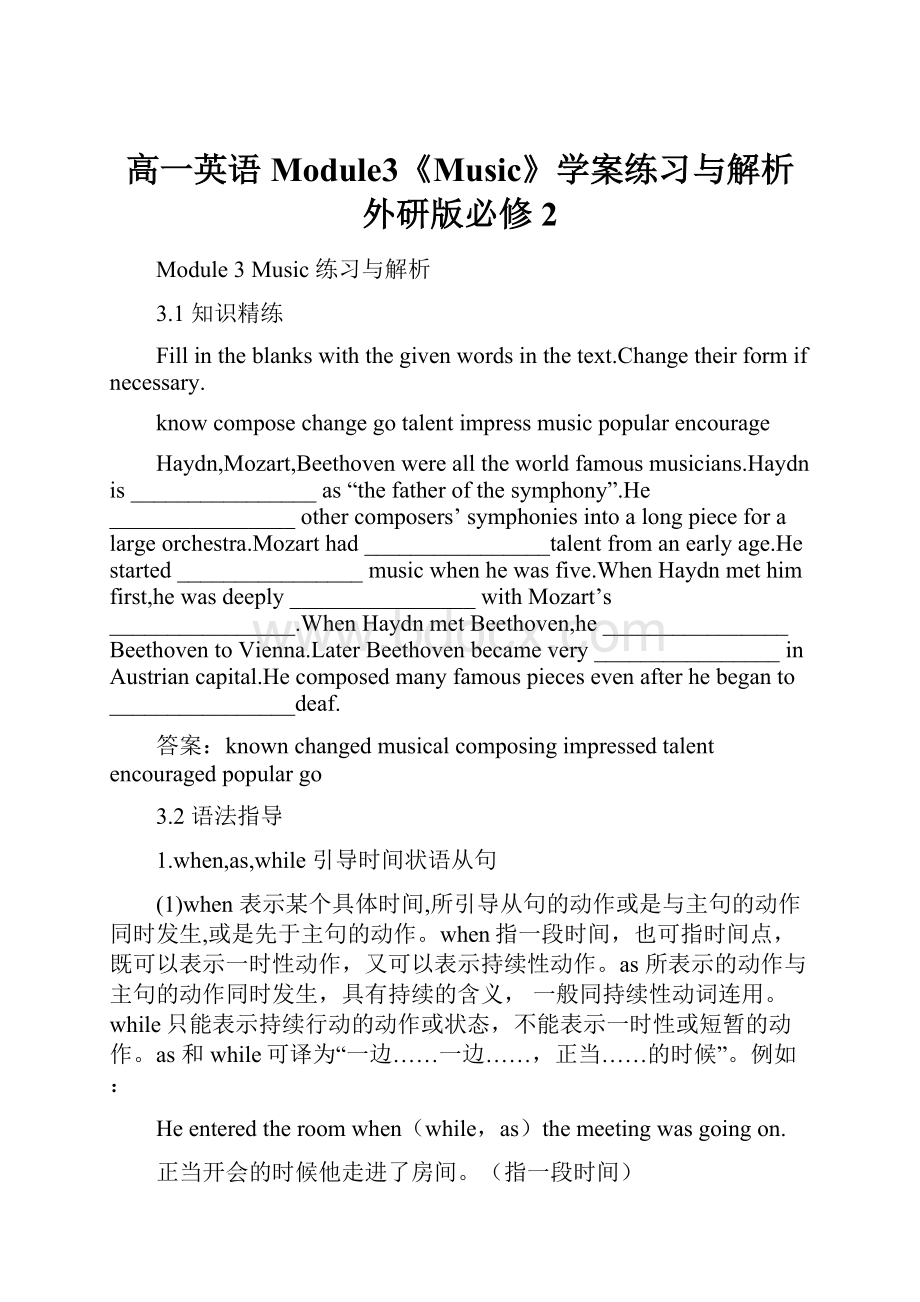高一英语Module3《Music》学案练习与解析外研版必修2.docx
《高一英语Module3《Music》学案练习与解析外研版必修2.docx》由会员分享,可在线阅读,更多相关《高一英语Module3《Music》学案练习与解析外研版必修2.docx(12页珍藏版)》请在冰豆网上搜索。

高一英语Module3《Music》学案练习与解析外研版必修2
Module3Music练习与解析
3.1知识精练
Fillintheblankswiththegivenwordsinthetext.Changetheirformifnecessary.
knowcomposechangegotalentimpressmusicpopularencourage
Haydn,Mozart,Beethovenwerealltheworldfamousmusicians.Haydnis________________as“thefatherofthesymphony”.He________________othercomposers’symphoniesintoalongpieceforalargeorchestra.Mozarthad________________talentfromanearlyage.Hestarted________________musicwhenhewasfive.WhenHaydnmethimfirst,hewasdeeply________________withMozart’s________________.WhenHaydnmetBeethoven,he________________BeethoventoVienna.LaterBeethovenbecamevery________________inAustriancapital.Hecomposedmanyfamouspiecesevenafterhebeganto________________deaf.
答案:
knownchangedmusicalcomposingimpressedtalentencouragedpopulargo
3.2语法指导
1.when,as,while引导时间状语从句
(1)when表示某个具体时间,所引导从句的动作或是与主句的动作同时发生,或是先于主句的动作。
when指一段时间,也可指时间点,既可以表示一时性动作,又可以表示持续性动作。
as所表示的动作与主句的动作同时发生,具有持续的含义,一般同持续性动词连用。
while只能表示持续行动的动作或状态,不能表示一时性或短暂的动作。
as和while可译为“一边……一边……,正当……的时候”。
例如:
Heenteredtheroomwhen(while,as)themeetingwasgoingon.
正当开会的时候他走进了房间。
(指一段时间)
Whenshecomes,Ishalltellhertowaitforyou.
她来的时候,我会告诉她让她等你的。
(指时间点,不能用while)
While(As)Jimwasreading,Jackwaswriting.
吉姆阅读的时候,杰克在写东西。
(指一段时间)
As(When)hefinishedthespeech,theaudienceburstintoapplause.
他讲话结束的时候,听众掌声雷动。
(指一点时间,不能用while)
Iwaswalkingalongtheroadwhensuddenlysomeonepattedmeontheshoulderfrombehind.
我正在路上走着,这时忽然有人从后面拍拍我的肩膀。
(这句中的when引导的从句相当于一个由and连接的并列分句,这里只能用when,意为“在那时,然后”等)
Note:
while还可以作并列连词,引导并列分句,相当于whereas,表示对比,可以为“……而……,……但是……”,有时相当于although(尽管)。
例如:
IamfondofEnglishwhilehelikesmaths.
我喜欢英语,而他却喜欢数学。
(此句中不能用when或as)
WhileIadmitthattheproblemisdifficult,Idon’tthinkthatitcan’tbesolved.
尽管我承认这个问题很难,但我并不认为无法解决。
(2)when有时表示“虽然,尽管”的含义,相当于although;有时具有“既然考虑到”的含义,相当于since;when还可作“如果”解,相当于if。
例如:
Hewalkedwhenhemighttakeataxi.
尽管他可以乘出租车,不过他还是步行。
HowcanIhelpthemwhentheywon’tlistentome?
既然他们不听我的话,我怎么帮助他们呢?
2.过去完成时
(1)表示在过去某个动作或某个具体时间之前已经发生、完成的动作或情况。
例如:
TheyhadgoteverythingreadybeforeIcame.
在我来之前,他们已经把一切准备好了。
Icouldseefromherfacethatshehadreceivedsomegoodnews.
从她的脸上我可以看出她有什么高兴事儿。
(2)过去完成时常用在有“hardly(scarcely)…when…,nosooner…than…”等的句子中。
例如:
Shehadhardly(scarcely)gonetobedwhenthebellrang.
她刚刚睡下铃就响了。
Nosooner________________theyleftthebuilding________________abombexploded.
A.have;thanB.had;when
C.did;asD.had;than
(D项正确。
他们刚刚离开那座大楼,炸弹就爆炸了。
)
(3)intend,mean,hope,want,plan,suppose,expect,think等动词的过去完成时可以用来表示本来打算做而没有做的事。
这种用法也可表示过去未曾实现的设想,意图或希望等,含有某种惋惜。
例如:
Ihadintendedtocallonyouyesterday,butsomeonecametoseemejustwhenIwasabouttoleave.
我本来昨天要去看你的,但是刚要出门就有人来访。
Wehadmeanttotellherthenewsbutfoundthatshewasn’tin.
我们本想把这消息告诉她的,但是发现她不在家。
Latersheexplained:
“Ihadthoughtthathehaddiedtenyearsago,butnowIknowthatheisstillliving.”
(我本以为……)
Ihadwantedtoinvitehertotheparty.
(我本来要……)
下面两句意思相同:
Hehadwantedtohelpyoubuthehadnotimethen.
Hewantedtohavehelpedyoubuthehadnotimethen.
他本想帮助你的,但当时没有时间。
Note:
①after从句表示过去时间的动作先后关系时,可用一般过去时或过去完成时。
例如:
Junewentouttotheparkaftershehadread(或read)thepaper.
②when从句表示过去时间时,有时一般过去时和过去完成时可换用。
例如:
Whentheteacherhadarrived(或arrived),theystoppedtalking.
③before从句表示过去时间时,主语中上述两种时态可换用。
例如:
Beforehecame,hehaddiscussed(或discussed)itwiththemanager.
表示“过去的将来”某一时刻之前已经完成的动作。
例如:
Shemadeuphermindtogoontryinguntilshehadsucceeded.
Theplanewouldtakeoffassoonasithadstoppedraining.
3.3典例剖析
A.例题分析
【例1】HemovedtoAmericawithhisparents________________.
A.inhisteensB.inhistens
C.intheteensD.inthetens
解析:
在某人十几岁时,用inone’steens而不是inone’stens。
中间用物主代词,不用定冠词。
inthe1990s(二十世纪九十年代),表达年代用定冠词the。
答案:
A
【例2】Smithisa________________nameinEnglish-speakingcountries.
A.commonB.ordinary
C.usualD.formal
解析:
(1)common常见的,普遍的
Thisiscommonsenseandeveryoneknowsit.这是常识,大家都知道。
(2)ordinary普通的,平常的
Mostofusareordinarypeople.我们大多数都是平常人。
(3)usual通常的,经常的(多用来指行为,习惯)。
asusual和平常一样
Ourheadteachercametoschoolearlyasusual.
我们的班主任和平时一样早早来到学校。
答案:
A
【例3】________________theredpaintwithblue,youwillgetanotherkindofbeautifulpaintofdifferentcolor.
A.MixedB.Mixing
C.MixD.Tomix
解析:
此处主语是you,所以mix这个动作应是主动含义。
所以用现在分词作状语。
mix可作及物动词或不及物动词。
Youcan’tmixwaterandoilbecausetheydon’tmix.
你不能把水和油混合在一起,因为它们不相融合。
【例4】Ilikeplaying________________,butIdon’tlikeplaying________________.
A.basketball;musicalinstruments
B.basketball;musicalinstrument
C.thebasketball;themusicalinstrument
D.abasketball;amusicalinstrument
解析:
打球不用冠词;弹某种乐器,乐器前用定冠词the。
答案:
A
【例5】Thepresident’sspeechwasreally________________andmostpeoplewere________________byit.
A.encouraging;encouraged
B.encouraged;encouraging
C.encourage;courageous
D.courageous;encouraged
解析:
像excite,interest,please,satisfy,frighten,move,bore,tire等及物动词都可以加-ing或-ed构成形容词,有时也称为现在分词或过去分词。
-ing形式表示主动含义,-ed形式表示被动含义。
答案:
A
【例6】Theman________________bytheleaderatthemeetingismygoodfriend.
A.refertoB.referringto
C.referredtoD.referabout
解析:
此处referredto是过去分词作定语,可以改为定语从句whowasreferredtobytheleaderatthemeeting。
referto意思是“提到,谈到;参考,查阅”。
答案:
C
B.错例分析
1.误:
WemadeXiaoWangthemonitorofourclass.
正:
WemadeXiaoWangmonitorofourclass.
解析:
当某些名词如captain,chairman,president,director,monitor,headmaster等作主语补足语、宾语补足语、表语补足语或同位语时,表示正式的或独一无二的头衔或职位时,前面一般不带冠词。
例如:
Hewaschosenheadmasterofthisschool.
他被选为这个学校的校长。
2.误:
ChairmanMaoiswellknownforagreatleader.
正:
ChairmanMaoiswellknownasagreatleader.
解析:
bewellknownas…意为“作为……而著名”,其后的名词多表示一个人的身份、职业等;bewellknownfor…意为“因……而著名”,其后多接表示某个人或物的特点、特长等方面的词语;bewellknownto意为“为……所知道”其后多接表示人的词语;bewellknownin意为“在某地很著名”。
例如:
(1)Guiliniswellknown________________itsbeautifulmountainsandrivers.
A.asB.for
C.toD.in
答案:
B
(2)Don’tusewords,expressionsorphrases________________onlytopeoplewithspecificknowledge.
A.beingknownB.havingbeenknown
C.tobeknownD.known
答案:
D
3.误:
Discoveringawell,theymadetheircampthere.
正:
Havingdiscoveredawell,theymadetheircampthere.
解析:
-ing形式的主动语态分为一般式和完成式两种。
-ing形式一般式所表示的动作与谓语动词所表示的动作一般同时进行,而完成式所表示的动作则在谓语动词所表示的动作之前已经完成了。
例如:
(1)________________theirwork,theyhadarest.
A.FinishingB.Finished
C.BeingfinishedD.Havingfinished
答案:
D
(2)________________suchheavypollutionalready,itmaynotbetoolatetocleanuptheriver.
A.HavingsufferedB.Suffering
C.TosufferD.Suffered
答案:
A
4.误:
Boblikesplayingthechess.
正:
Boblikesplayingchess.
解析:
一般而言,球类运动、棋类游戏等名称前不用冠词thea(an)。
例如:
playfootball;playchess(bridge);而乐器名称前用the。
例如:
Icanplaythepiano.
5.误:
Itwasintheparkwherehemetanoldfriendyesterday.
正:
Itwasintheparkthathemetanoldfriendyesterday.
解析:
这是一个强调句型,其结构是“Itis/was+被强调部分+that-clause”。
例如:
(1)ItwasinGreece________________thatOlympiccompetitionsstarted.
(2)Itwashowtheyoungmanhadlearnedfiveforeignlanguages________________attractedtheaudience’sinterest.
A.sothatB.that
C.whatD.inwhich
答案:
B
(3)Itwasforthisreason________________herunclemovedoutofNewYorkandsettleddowninasmallvillage.
A.whichB.why
C.thatD.how
答案:
C
6.误:
MyteacherencouragedmetospeakingEnglish.
正:
MyteacherencouragedmetospeakEnglish.
解析:
鼓励某人干某事:
encouragesb.todosth.
在某一方面鼓励某人:
encouragesb.insth.例如:
Iencouragehiminhisstudy.我鼓励他好好学习。
7.误:
Thesongispopularinstudents.
正:
Thesongispopularwithstudents.
解析:
popularwithsb.某人所喜爱、赞赏或欢迎的。
例如:
Amanwhoispopularwithhisneighbors.一位受邻居欢迎的人。
8.误:
Hewentalmostmadlywhenheheardthenews.
正:
Hewentalmostmadwhenheheardthenews.
解析:
go为连系动词,其后接形容词作表语。
例如:
gohungry挨饿gomad疯了gowrong机器坏了
gocold变冷goblind变瞎gowild发狂
C.知识点精析
1.AfterstudyingmusicinVienna,HaydnwenttoworkatthecourtofaprinceinEasternAustria,…
解析:
after一词有多种意思和用法。
本课中after用作介词,接动名词或名词。
例如:
(1)AftervisitingIndia,theBeatleschangedtheirinstruments.
参观印度以后,甲壳虫乐队换了乐器。
(2)Aftergraduation,heworkedthereasalecturer.
毕业以后,他在那里当讲师。
除此之外,after还作连词。
例如:
(3)AftertheBeatlesvisitedIndia,theychangedtheirinstruments.
(4)Afterhegraduated,heworkedthereasalecturer.
2.Hechangedthesymphonyintoalongpieceforalargeorchestra.
解析:
change…into/to“改变、变化、使变成……”。
例如:
(1)Thetrafficlightschangedfromredtogreen.那交通灯从红色变成绿色。
(2)Thewitchchangedtheprinceintoafrog.巫婆把王子变成了青蛙。
3.HewasborninavillageinAustria,thesonofapeasant.
解析:
thesonofapeasant是he的同位语,是对he的进一步说明。
例如:
(1)AbrahamLincoln,thesonofapoorfamily,wasborninKentuckyonFebruary12,1809.
(2)LinCheng,16,asenior2middleschoolstudentfromFujing,wonagoldmedalinthecompetition.
4.Whilehewasstillateenager,MozartwasalreadyabigstarandtouredEuropegivingconcerts.
解析:
(1)while作连词,引导时间状语从句,意为“当……时候”。
例如:
MywifekeptsilentwhileIwaswriting.当我写字的时候,我的夫人就默不作声。
(2)引导让步状语从句,相当于although“虽然、尽管”。
例如:
WhileIlikethecolorofthehat,Idonotlikeitsshape.
(3)连接并列结构的句子,表示对比、转折,意为“而”。
例如:
HeisaworkerwhileIamadoctor.
5.Helearnedtoplaytheharpsichordwhenhewasfour.
解析:
learntodosth.意为“学会干某事”。
例如:
learntoswim,totalk,tofly学会游泳、说话、飞行。
6.forthefirsttime“首次、第一次”。
它表示有生以来或一段时间中第一次做某事,在句中作状语。
解析:
time意为“次、次数”forthefirst/lasttime“第一(最后一)回”。
例如:
Helovedherwhenhemetherforthefirsttime.
HewasinvitedtoBeijingforthefirsttimethatyear.
7.trytodosth.和trydoingsth.
解析:
trytodosth.意为“努力干……;企图干……”。
例如:
(1)Wetrytocatchupwiththem.我们努力赶上他们。
而
trydoingsth.“试着干